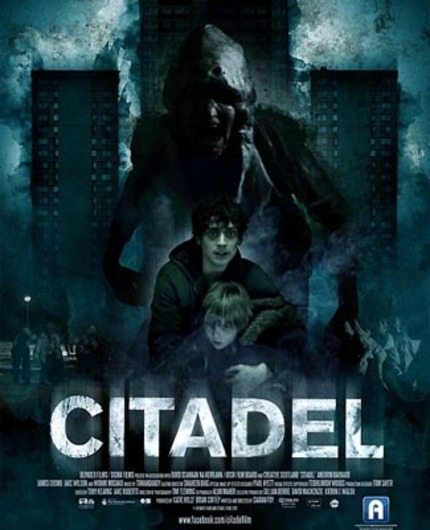Sometimes a cigar is just a cigar, or as the case may be
with Citadel,
a group of violent, marauding child-demons is exactly that. Cirian Foy's first
feature film is nearly everything a horror film should be: creepy, atmospheric,
and packed full of quality scares that run the gamut from good old fashioned
"bump in the night" terror to something a little more lingeringly disturbing.
Unfortunately, the two halves of Citadel
both feel like very different but nonetheless high-quality works of art,
stitched together in a fashion that doesn't quite hide the seams.
The film begins with Tommy (Aneurin Barnard) and his pregnant wife Joanne (Amy Shiels) preparing to leave their home in a run-down housing
project. Just as they are about to take their first step towards a better life,
the young couple is tragically ripped apart when a band of young boys savagely
beats Joanne within an inch of her life while Tommy watches, trapped behind a
jammed elevator door. Doctors are able to save their newborn daughter, but
Joanne slips into a coma and Tommy is rendered a nearly helpless agoraphobic,
shuttling between the isolated buildings of the blighted urban landscape like a
ghost haunting the halls of an abandoned home. Soon after Tommy finally makes
the decision to take his wife off of life support, he begins seeing telltale
signs of the mysterious children everywhere. There is a break-in attempt at his
apartment, and the rather intense priest who presides over Joanne's funeral
gives him a cryptic warning, insisting that the youths will soon return for
Emma.
There are certainly hints that the feral child monsters that
stalk Tommy and Emma represent something else entirely. A nurse who befriends Tommy makes
reference to the severity of the socio-economic situation in Tommy's
neighborhood and decries the priest's proffered solution (decimate the
abandoned building where they reside) as barbaric. It's a heavy-handed
metaphor, but one that is never fully realized within the story's running time.
This is not the only piece of information in Citadel the remains muddy. Who or what the child-things are is
never quite explained, save for some heated bits of dialogue from the priest,
who may as well have been named Father Exposition, given how much mythos and
background story he regurgitates at the viewer in every scene he chews. There's
some vague nonsense about a junkie who gave birth to twins years ago, and some
talk of demons, but once Tommy and Father Expo hit upon their mission to
exterminate the children, nearly every obstacle is immediately met with a
convenient solution in an out and out race towards the finish line. It's a credit to Foy the script remains interesting despite its refusal to firmly commit to any one explanation for what exactly is happening and why.
The difference between the two story-halves is striking,
with bold shifts in pacing and mood raining down from nowhere a few minutes
past the halfway mark. It almost feels as though Foy began a film about a man
coming to terms with the loss of his wife, couldn't figure out how to end it,
and so blew the dust off the third act of an old monster script he had laying
around before reverse engineering the entire plot. As previously stated,
there's much to enjoy in both the slow-burning, beautiful decay of the first
half and the fantastic demon-hunting caper of the second, but the segments feel
distinct and hastily cobbled together, like a student trying to pull off a last
minute term paper with a few pages of scribbled notes.
Citadel looks
great, with clean, sterile camerawork highlighting Tommy's loneliness and
despair in the first half, and frantic, kinetic photography driving home the
action-oriented conclusion. The scares are never contrived and always
effective, and aside from the inherently confusing and half-baked nature of the
demonic children's mythology, the story is unique and fascinating. Yet the
entire film never quite gels as an allegory for overcoming one's own fears, even
though that goal is readily apparent, as is Foy's immense talent and potential
as a filmmaker. Given his natural eye and innate sense of what is simultaneously
frightening and compelling, there can be no doubt that the writer/director will
impress later down the line.

Do you feel this content is inappropriate or infringes upon your rights?
Click here to report it, or see our
DMCA policy.








